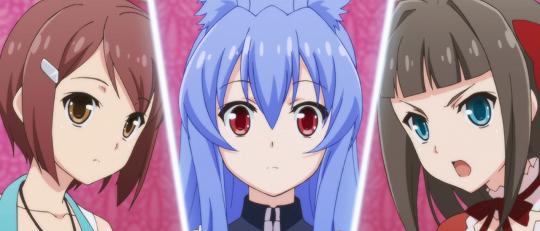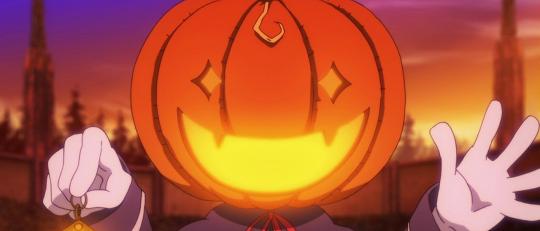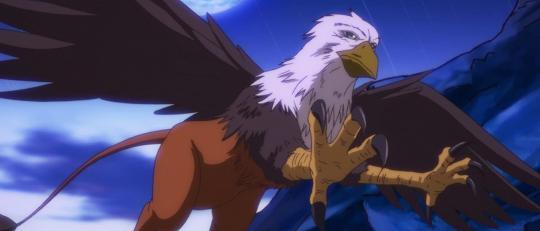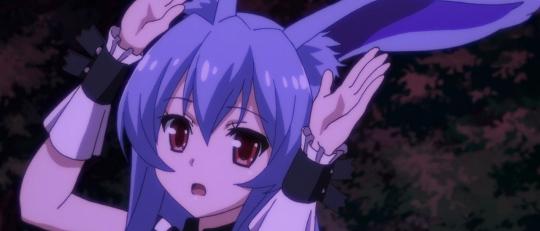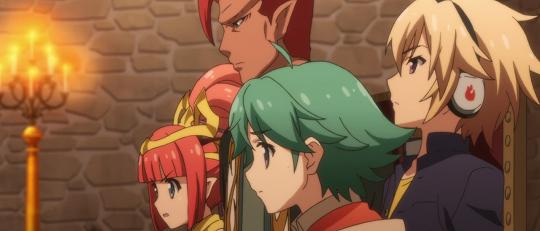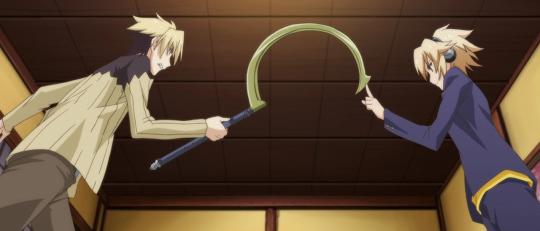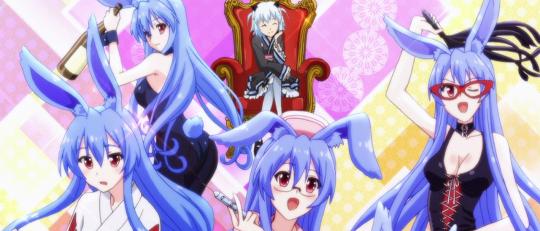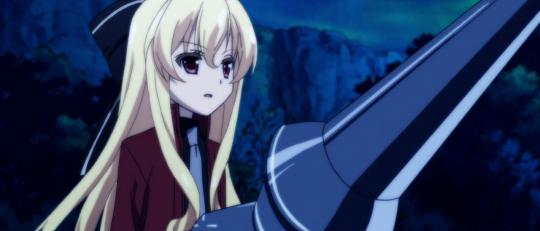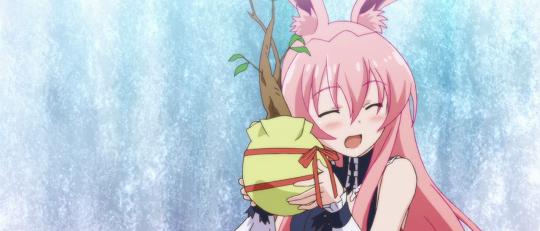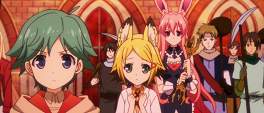If you were in a hurry you could easily mistake Mondaiji-tachi’s premise for No Game No Life’s: bored children get transported to an alternate world where they join an underdog group and take part in sanctioned games to win glory and territory. Even though, it give it it’s full title, Mondaiji-tachi ga Isekai Kara Kuru Sou Desu yo? (Problem Children are Coming from Another World, aren’t they?) starts with the same kind of torturous lateral thinking that typifies NGNL, their core difference is that series’ reliance on the “games” is all-encompassing and its fantasy-tinged world is a lot more cohesive than the everything-and-the-kitchen-sink approach taken here.
Its poster child, Black Rabbit (who is for some reason primarily blue as well as sometimes pink), is a prime example of this. Bunny girls are few and far between in anime in general, far more often it’s cat girls and fox girls who steal the limelight, yet here, just in case bunny girls aren’t your thing, there are also cat girls. And dog girls. And vampires. And fairies. And lizard people. And weretigers. You get the idea. Coherence or even a united vision for the series’ world isn’t high on the list of priorities and it prefers to throw enough at you in the hope that some of it sticks.
That goes for more than just animal folk though with the story taking in Medusa and Perseus as well as the Pied Piper and a Gryphon, no mythology or time period is free from cherry picking here. In a way the melange of famous western fantasy characters works thanks to the plot breaking up the conflicting influences into discrete storylines; so whereas the fight with the weretiger is immediately followed by a confab with Perseus, the two don’t overlap. This situation remains true until the final and most significant story arc - spanning five of the series’ petite ten episodes - which although ostensibly concerns the Pied Piper of Hamelin, really just boils down to hitting things until they fall over.
Not unexpected given that one of the three eponymous “problem children” is a typical shounen punk with absurd strength and a disregard for authority. The issue arises in that although all of the children are overpowered, earlier storylines went to great lengths not to use the male as a cudgel and to prove that the other two, a girl who can speak to animals and a girl with Power Speak, can hold their own. So following a solution that involved more puzzling than punching, it’s disappointing to regress back into “I’m getting so pumped hitting you!”, especially when one of the conditions for winning the story’s Gift Game is solving a rather ambiguous riddle. Well the riddle was solved, but I guess pugilism is still on the table.
The Gift Games themselves are another point of contention because despite being the raison d'etre for the star sized planet they’re on, charmingly titled the “Little Garden”, they seem to only be used for disproportionately weighted contests (David and Goliath style fights); thievery, subterfuge and brawling still seem to be more than adequate means for advancing in the world, raising the question of why have the Gift Games at all? This is to say nothing of the so-called “Demon Kings” who supposedly prowl Little Garden and do… something? Like a lot of points in the story after the first episode’s unceremonious lore dump, Demon Kings are introduced and generally accepted to be a Bad Thing but very little is mentioned as to why.
Just like how all of the children are nonplussed at being forcibly torn from their world and unceremoniously plonked on another. No homesickness, no language issues, no problems. After all, one of them got to punch a dragon while another shoulder-locked a lycanthrope with shark teeth all within an hour of landing. As the audience you are expected to blithely go along with this baseline level of zaniness and appreciate the frequent scuffles while overlooking the glaring issues. Issues like child killing, hostage taking and the two female leads always being in some state of incapacitation while the male lead charges ahead while making lewd jokes. By the end you don’t even blink when a giant red robot that shouts “DEEN!” starts wailing on a flying ceramic golem. That’s the same giant red robot that was built by a group of fairies by the way.
While this all may sound great in principle, it’s crazy in the same way that a fruit salad with kumquats and dragon fruits is crazy: it looks great and tastes fine but fundamentally it’s still just a fruit salad. A shrug of the shoulders and a resigned admission that it’s not that bad is really the best that you can hope for a ten episode, ludicrously titled light novel adaptation whose hook is underutilised and main attraction is a scatty bunny girl and allusions to Sailor Moon. The bad guys are all baby-munching megalomaniacs while the good guys will no doubt return this land to its once former glory! - it’s entertaining and for the most part inoffensive. But, perhaps due to its length and ideas above its station, you are left with more questions about the series than you have answers to. Who summoned the children? Why does the rabbit’s hair turn pink? What do these Demon Kings actually do?
A second season would no doubt solve a lot of these problems but with a mediocre start and equivalent home video sales it seems unlikely that Mondaiji-tachi will see a return. That’s ignoring the lascivious, out of character and no doubt desperate attempt by the OVA to gain some fans through out-and-out crudity. An ignominious swan song (though miles from Princess Lover’s follow up OVAs…) for a pleasant but humdrum series that spreads itself too thinly and only remains memorable for the length of an episode.
